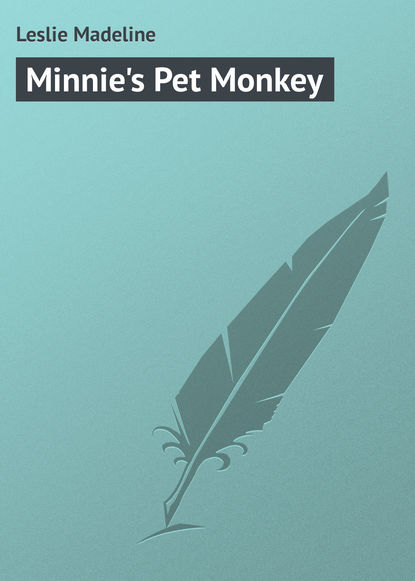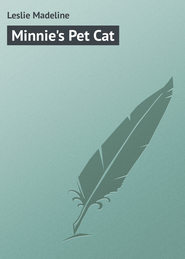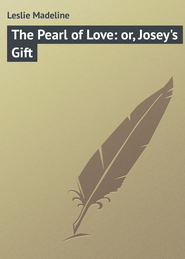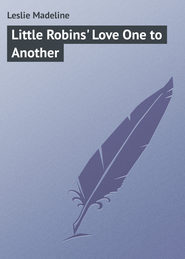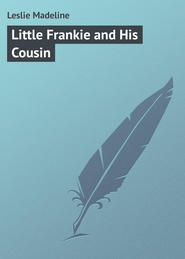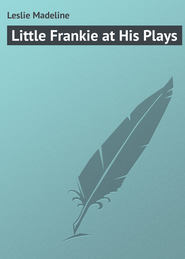По всем вопросам обращайтесь на: info@litportal.ru
(©) 2003-2024.
✖
Minnie's Pet Monkey
Настройки чтения
Размер шрифта
Высота строк
Поля
“Sprite was very fond of beetles, and also of spiders, and his mistress used sometimes to hold his chain, lengthened by a string, and make him run up the curtains, and clear out the cobwebs for the housekeeper.
“On one occasion, he watched his opportunity, and snatching the chain, ran off, and was soon seated on the top of a cottage, grinning and chattering to the assembled crowd of schoolboys, as much as to say, ‘Catch me if you can.’ He got the whole town in an uproar, but finally leaped over every thing, dragging his chain after him, and nestled himself in his own bed, where he lay with his eyes closed, his mouth open, his sides ready to burst with his running.
“Another time, the little fellow got loose, but remembering his former experience, only stole into the shed, where he tried his hand at cleaning knives. He did not succeed very well in this, however, for the handle was the part he attempted to polish, and, cutting his fingers, he relinquished the sport.
“Resolved not to be defeated, he next set to work to clean the shoes and boots, a row of which were awaiting the boy. But Sprite, not remembering all the steps of the performance, first covered the entire shoe, sole and all, with the blacking, and then emptied the rest of the Day & Martin into it, nearly filling it with the precious fluid. His coat was a nice mess for some days after.
“One morning, when the servants returned to the kitchen, they found Sprite had taken all the kitchen candlesticks out of the cupboard, and arranged them on the fender, as he had once seen done. As soon as he heard the servants returning, he ran to his basket, and tried to look as though nothing had happened.
“Sprite was exceedingly fond of a bath. Occasionally a bowl of water was given him, when he would cunningly try the temperature by putting in his finger, after which he gradually stepped in, first one foot, then the other, till he was comfortably seated. Then he took the soap and rubbed himself all over. Having made a dreadful splashing all around, he jumped out and ran to the fire, shivering. If any body laughed at him during this performance, he made threatening gestures, chattering with all his might to show his displeasure, and sometimes he splashed water all over them.
“Poor Sprite one day nearly committed suicide. As he was brought from a very warm climate, he often suffered exceedingly, in winter, from the cold.
“The cooking was done by a large fire on the open hearth, and as his basket, where he slept, was in one corner of the kitchen, before morning he frequently awoke shivering and blue. The cook was in the habit of making the fire, and then returning to her room to finish her toilet.
“One morning, having lighted the pile of kindlings as usual, she hung on the tea-kettle and went out, shutting the door carefully behind her.
“Sprite thought this a fine opportunity to warm himself. He jumped from his basket, ran to the hearth, and took the lid of the kettle off. Cautiously touching the water with the tip of his finger, he found it just the right heat for a bath, and sprang in, sitting down, leaving only his head above the water.
“This he found exceedingly comfortable for a time; but soon the water began to grow hot. He rose, but the air outside was so cold, he quickly sat down again. He did this several times, and would, no doubt, have been boiled to death, and become a martyr to his own want of pluck and firmness in action, had it not been for the timely return of the cook, who, seeing him sitting there almost lifeless, seized him by the head and pulled him out.
“He was rolled in blankets, and laid in his basket, where he soon recovered, and, it is to be hoped, learned a lesson from this hot experience, not to take a bath when the water is on the fire.”
CHAPTER VII.
KEES STEALING EGGS
When Minnie was nine years of age, she accompanied her parents to a menagerie, and there, among other animals, she saw a baboon. She was greatly excited by his curious, uncouth manœuvres, asking twenty questions about him, without giving her father time to answer. On their way home, she inquired, —
“Are baboons one kind of monkeys, father?”
“Yes, my daughter; and a more disagreeable, disgusting animal I cannot conceive of.”
“I hope you are not wishing for a baboon to add to your pets,” added her mother, laughing.
“I don’t believe Jacko would get along with that great fellow at all,” answered the child. “But, father, will you please tell me something more about the curious animals?”
The conversation was here interrupted by seeing that a carriage had stopped just in front of their own, and that quite a crowd had gathered about some person who seemed to be hurt.
Minnie’s sympathies were alive in an instant. She begged her father to get out, as possibly he might be of some use.
The driver stopped of his own accord, and inquired what had happened, and then they saw that it was a spaniel that was hurt. He had been in the road, and not getting out of the way quick enough, the wheel had gone over his body.
The young lady who was in the buggy was greatly distressed, from which Minnie argued that she was kind to animals, and that they should like her.
The owner of the dog held the poor creature in her arms, though it seemed to be in convulsions, and wept bitterly as she found it must die.
Mr. Lee, to please his little daughter, waited a few minutes; but he found her getting so much excited over the suffering animal, he gave John orders to proceed.
During the rest of the drive, she could talk of nothing else, wondering whether the spaniel was alive now, or whether the young man in the buggy paid for hurting it.
The next day, however, having made up her mind that the poor creature must be dead, and his sufferings ended, and having given Tiney many admonitions to keep out of the road when carriages were passing, her thoughts turned once more to the baboon.
Mr. Lee found in his library a book which gave a short account of the animal, which he read to her.
“The baboon is of the monkey tribe, notwithstanding its long, dog-like head, flat, compressed cheeks, and strong and projecting teeth. The form and position of the eyes, combined with the similarity of the arms and hands, give to these creatures a resemblance to humanity as striking as it is disgusting.”
“Then follows an account,” the gentleman went on, “of the peculiarities of different kinds of baboons, which you would not understand.”
“But can’t you tell me something about them yourself, father?”
“I know very little about the creatures, my dear; but I have read that they are exceedingly strong, and of a fiery, vicious temper.
“They can never be wholly tamed, and it is only while restraint of the severest kind is used, that they can be governed at all. If left to their own will, their savage nature resumes its sway, and their actions are cruel, destructive, and disgusting.”
“I saw the man at the menagerie giving them apples,” said Minnie; “but he did not give them any meat all the time I was there.”
“No; they subsist exclusively on fruits, seeds, and other vegetable matter. In the countries where they live, especially near the Cape of Good Hope, the inhabitants chase them with dogs and guns in order to destroy them, on account of the ravages they commit in the fields and gardens. It is said that they make a very obstinate resistance to the dogs, and often have fierce battles with them; but they greatly fear the gun.
“As the baboon grows older, instead of becoming better, his rage increases, so that the slightest cause will provoke him to terrible fury.”
“Is that all you know about them?”
“Why, Minnie, in order to satisfy you, any one must become a walking encyclopædia. What other question have you to ask?”
“Why, they must have something to eat, and how are they to get it unless they go into gardens?”
Mr. Lee laughed aloud. “I rather think I should soon convince them they were not to enter my garden,” he said, emphatically. “But seriously, they descend in vast numbers upon the orchards of fruit, destroying, in a few hours, the work of months, or even of years. In these excursions, they move on a concerted plan, placing sentinels on commanding spots, to give notice of the approach of an enemy. As soon as he perceives danger, the sentinel gives a loud yell, and then the whole troop rush away with the greatest speed, cramming the fruit which they have gathered into their cheek pouches.”
Minnie looked so much disappointed when he ceased speaking, that her mother said, “I read somewhere an account of a baboon that was named Kees, who was the best of his kind that I ever heard of.”
“Yes, that was quite an interesting story, if you can call it to mind,” said the gentleman, rising.
“It was in a book of travels in Africa,” the lady went on. “The traveller, whose name was Le Vaillant, took Kees through all his journey, and the creature really made himself very useful. As a sentinel, he was better than any of the dogs. Indeed, so quick was his sense of danger, that he often gave notice of the approach of beasts of prey, when every thing was apparently secure.
“There was another way in which Kees made himself useful. Whenever they came across any fruits or roots with which the Hottentots were unacquainted, they waited to see whether Kees would taste them. If he threw them down, the traveller concluded they were poisonous or disagreeable, and left them untasted.
“Le Vaillant used to hunt, and frequently took Kees with him on these excursions. The poor fellow understood the preparations making for the sport, and when his master signified his consent that he should go, he showed his joy in the most lively manner. On the way, he would dance about, and then run up into the trees to search for gum, of which he was very fond.
“I recall one amusing trick of Kees,” said the lady, laughing, “which pleased me much when I read it. He sometimes found honey in the hollows of trees, and also a kind of root of which he was very fond, both of which his master insisted on sharing with him. On such occasions, he would run away with his treasure, or hide it in his pouches, or eat it as fast as possible, before Le Vaillant could have time to reach him.
“These roots were very difficult to pull from the ground. Kees’ manner of doing it was this. He would seize the top of the root with his strong teeth, and then, planting himself firmly against the sod, drew himself gradually back, which forced it from the earth. If it proved stubborn, while he still held it in his teeth he threw himself heels over head, which gave such a concussion to the root that it never failed to come out.
“Another habit that Kees had was very curious. He sometimes grew tired with the long marches, and then he would jump on the back of one of the dogs, and oblige it to carry him whole hours. At last the dogs grew weary of this, and one of them determined not to be pressed into service. He now adopted an ingenious artifice. As soon as Kees leaped on his back, he stood still, and let the train pass without moving from the spot. Kees sat quiet, determined that the dog should carry him, until the party were almost out of sight, and then they both ran in great haste to overtake their master.
“Kees established a kind of authority over the dogs. They were accustomed to his voice, and in general obeyed without hesitation the slightest motions by which he communicated his orders, taking their places about the tent or carriage, as he directed them. If any of them came too near him when he was eating, he gave them a box on the ear, and thus compelled them to retire to a respectful distance.”
“Why, mother, I think Kees was a very good animal, indeed,” said Minnie, with considerable warmth.





